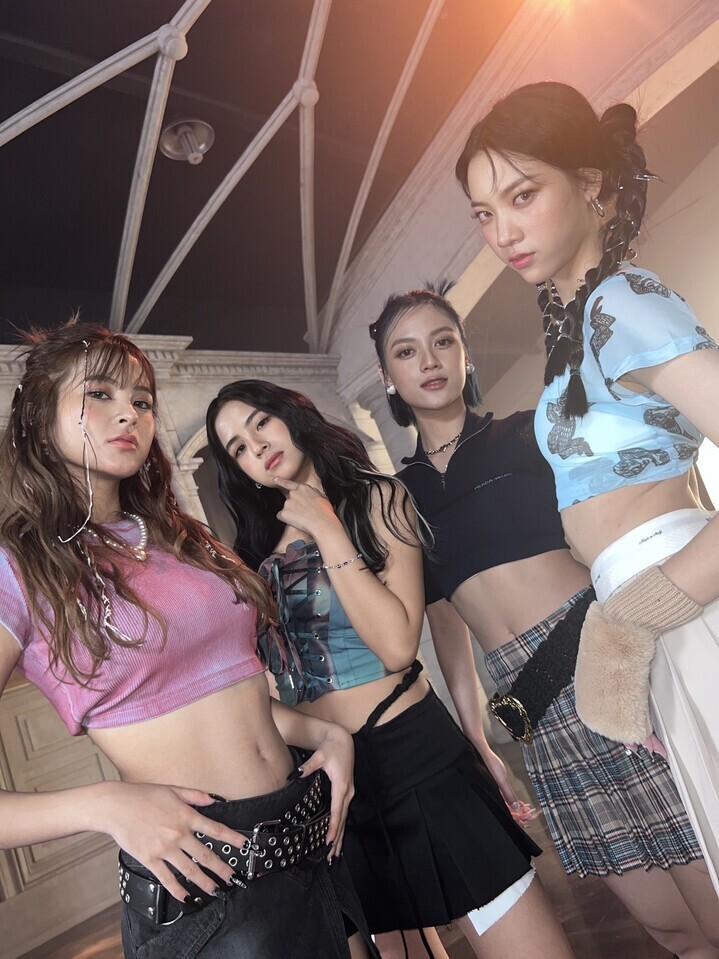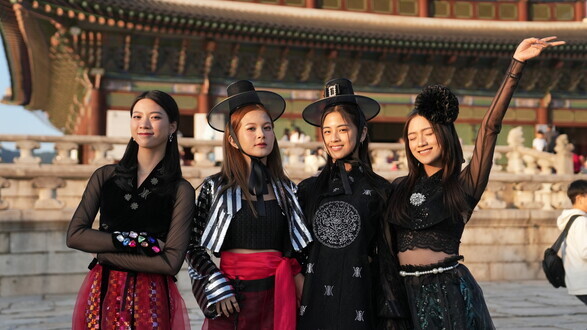hankyoreh
Links to other country sites 다른 나라 사이트 링크
Up-and-coming Indonesian group StarBe spills what it learned during K-pop training in Seoul

On Tuesday, the members of the girl group StarBe returned home after a stint in Korea. Consisting of four members, StarBe is an “Indo-pop” girl group that debuted in 2019. Despite their roots in Indonesia, the ensemble packed their bags for Korea to receive K-pop training for three months.
The Hankyoreh met up with the group’s four members — Abelle, Chelsea, Kezia and Shella — at Soon ENT’s office in the Hapjeong neighborhood of Mapo District, Seoul, on Nov. 9, five days before they were due to return home, to find out what they had learned from the K-pop system and to get their take on what makes K-pop so competitive.
K-pop was a key influence for StarBe from the very start. Indonesian pop groups that were based on Anglo-American pop started to fade away at a certain point. That’s when StarBe stepped in to fill the void.
“We wanted our style to be based on hip-hop and K-pop. Everything about K-pop was fresh: the fashion, the choreography, the camera work,” the group said. “All those factors influenced and fueled the birth of StarBe.”
Their music video for their hit song “Time to Fly” went viral, racking up over 4 million views on YouTube.
StarBe came to Korea as a recipient of the “Grow Twogether” project, a pop culture industry-based exchange program organized by the Korean Foundation for International Cultural Exchange.

Following exchanges with Vietnam and Thailand, Indonesia was selected as the target of the exchange program for this year. Abelle, the leader of StarBe, said, “In Indonesia, we practiced for two hours a day, but in Korea, we practiced for seven to eight hours. It was hard, but after we followed that routine for quite a while, what seemed impossible turned out to be doable. I think we’ve become more expressive and varied when it comes to our facial expressions and body language.”
K-pop is based on an intense training system, which often comes under fire for alleged human rights violations. Nonetheless, that system is what gives K-pop its competitive streak. Nowadays, the system is less abusive and more organized, rational training systems have become mainstream.
StarBe’s training had an immediate impact. During the training period, StarBe released a new song, “Bang,” and performed it for the first time on Sept. 8 at the 2023 Asia Song Festival, which was held at Seoul’s Yeouido Park.
The members shared that while they were initially very nervous, their anxieties magically melted away the moment they stepped on stage, allowing them to focus on nailing their choreography.
“There was a moment when my in-ear monitor fell out and I slightly panicked after losing my sense of rhythm, but muscle memory kicked in and I was able to finish the performance,” Abelle recalls. The hard training had, indeed, paid off.

One of K-pop’s special strengths is K-beauty. “All K-pop singers have impeccable skin and are great with makeup. Even men focus on skin care. I love Korean cosmetics so much that I go to Olive Young twice a week,” said Kezia with a laugh, referring to a popular health and beauty chain.
The group flaunts a Korean beauty-inspired look in the music video for their new song, “Bang.”
“Our fans were so surprised, they couldn’t believe that it was us in the video,” said Kezia. “Even when we go back to Indonesia, we want to continue following K-beauty makeup and K-fashion.” K-beauty, which spans makeup, fashion, and design, is a key feature of K-pop.
The group also focused on creating content for YouTube, TikTok, and other platforms during their training in South Korea.
Together with Soon ENT, a management company for short-form video creators, they created not only K-pop music and choreography, but also Korean cultural experience content. The Indonesian pop stars ordered food for delivery along the Han River and visited Changgyeong Palace during a special night-time opening.
Together, the content created by the accounts used by the group and its members have amassed over 100 million views. K-pop groups have been utilizing YouTube, TikTok, and other forms of social media to connect with fans around the world.
Examples include BTS’ self-produced web series “Run BTS!” and Seventeen’s “Going Seventeen.” Utilizing new media platforms has also become a strong competitive advantage for K-pop.

“Bang” is a collaboration between a Korean music director and an Indonesian producer, and the members also participated in the development of the song. While the song is based on K-pop, it also contains elements of Indonesian music.
The song is sung in English and Korean, but also includes Indonesian lyrics and sounds of traditional Indonesian instruments. The music video features images of the colors of the Indonesian flag and the South Korean flag, as well as Indonesian-inspired props. “We wanted to combine K-pop and Indo-pop, but with our own twist,” Abelle explained.
K-pop works in the global market because of unique elements that stand out in comparison to traditional Anglo-American pop. In addition to having Korean lyrics, K-pop sometimes utilizes traditional Korean music, costumes and architecture.
Nowadays, the trend is changing. Major agencies such as Hybe and JYP are trying to expand the genre into universal pop without the “K-” prefix.

Songs are being sung entirely in English and collaborations with international artists and producers are becoming more frequent. This has been met with concerns that K-pop could lose its unique color, while others contend that this is a strategy for K-pop to take a bigger leap and expand.
“We want to convey the message that Indonesia, which is made up of more than 17,000 islands and is home to many different races, ethnicities, religions, and ideas, can still be united through our music. Ultimately, we also want to convey the message that the world is one, and seeing the development of K-pop has given us the confidence that we can do it too,” the members of StarBe stated.
No matter what path K-pop takes in the future, it’s clear that it will continue to serve as a model for other countries.
By Suh Jung-min, staff reporter
Please direct questions or comments to [english@hani.co.kr]

Editorial・opinion
![[Column] The state is back — but is it in business? [Column] The state is back — but is it in business?](https://flexible.img.hani.co.kr/flexible/normal/500/300/imgdb/original/2024/0506/8217149564092725.jpg) [Column] The state is back — but is it in business?
[Column] The state is back — but is it in business?![[Column] Life on our Trisolaris [Column] Life on our Trisolaris](https://flexible.img.hani.co.kr/flexible/normal/500/300/imgdb/original/2024/0505/4817148682278544.jpg) [Column] Life on our Trisolaris
[Column] Life on our Trisolaris- [Editorial] Penalties for airing allegations against Korea’s first lady endanger free press
- [Editorial] Yoon must halt procurement of SM-3 interceptor missiles
- [Guest essay] Maybe Korea’s rapid population decline is an opportunity, not a crisis
- [Column] Can Yoon steer diplomacy with Russia, China back on track?
- [Column] Season 2 of special prosecutor probe may be coming to Korea soon
- [Column] Park Geun-hye déjà vu in Yoon Suk-yeol
- [Editorial] New weight of N. Korea’s nuclear threats makes dialogue all the more urgent
- [Guest essay] The real reason Korea’s new right wants to dub Rhee a founding father
Most viewed articles
- 160% of young Koreans see no need to have kids after marriage
- 2[Column] Life on our Trisolaris
- 3Amid US-China clash, Korea must remember its failures in the 19th century, advises scholar
- 4New sex-ed guidelines forbid teaching about homosexuality
- 5[Column] The state is back — but is it in business?
- 6How daycares became the most viable business for the self-employed
- 7Presidential office warns of veto in response to opposition passing special counsel probe act
- 8OECD upgrades Korea’s growth forecast from 2.2% to 2.6%
- 9Hybe-Ador dispute shines light on pervasive issues behind K-pop’s tidy facade
- 10[Reporter’s notebook] In Min’s world, she’s the artist — and NewJeans is her art